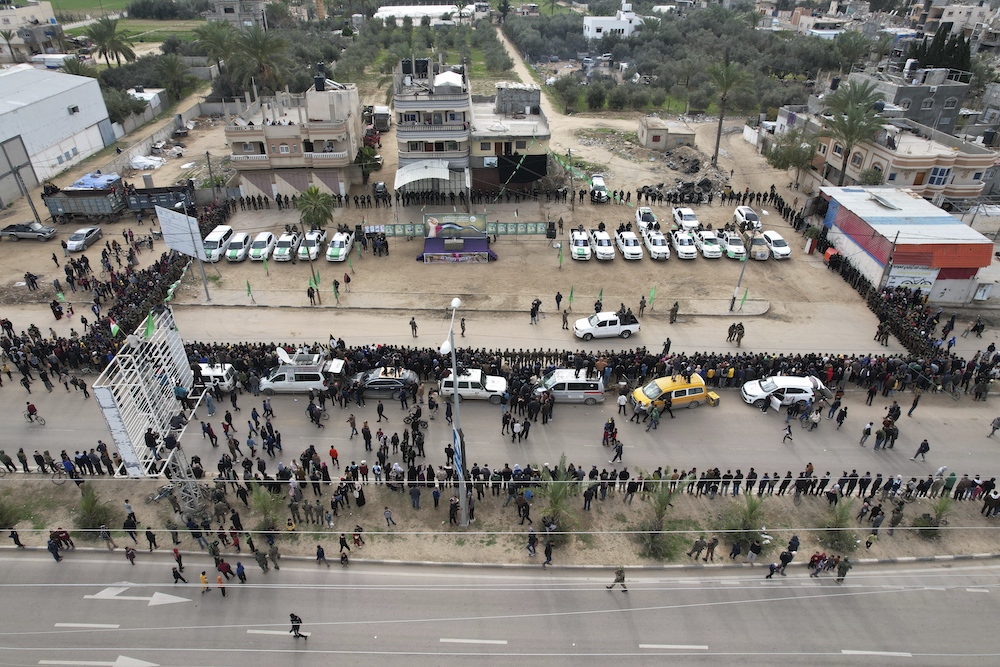CAIRO/JERUSALEM: Palestinian residents of eastern neighborhoods of Khan Younis in the southern Gaza Strip fled their homes on Tuesday as Israeli tanks advanced deep into the area after Israel ordered the population to evacuate.
The tanks pushed into the Khan Younis town of Bani Suhaila and several districts nearby were bombed for a second day, forcing tens of thousands of civilians to seek refuge elsewhere. Israel said its action was to prevent Hamas fighters from regrouping.
Gaza health officials said Israeli military strikes since Monday killed at least 80 Palestinians in the Khan Younis area — adding to a death toll of more than 39,000 in nearly 10 months of warfare, according to Gaza authorities’ figures.
The Israeli military said Hamas and other groups used those areas to renew attacks, including firing rockets.
UN officials described scenes of despair on Tuesday as Israeli airstrikes hit the area.
“The situation is impossible,” the UN’s Palestinian refugee agency UNRWA said on X.
In a later post, it said there was nowhere safe to go in Gaza.
“People are exhausted from the continuous displacement and unlivable conditions & they are trapped in increasingly small & overcrowded areas,” it said.
The Israeli military said dozens of militants had been killed in Khan Younis by its tanks and warplanes or in close-quarter combat. Weapon caches and tunnels used by the militants had been destroyed, it said.
Palestinian medics said one person was killed in an Israeli airstrike in the area on Tuesday. The Gaza health ministry does not distinguish between combatants and non-combatants. Health officials have said most of those killed have been civilians.
Residents in Khan Younis said tanks remained stationed deep inside Bani Suhaila. Soldiers were seen searching inside the town’s main cemetery, while others commandeered roofs of high-rise buildings, firing their guns toward the western areas from time to time, residents said.
In the Bureij camp in the central Gaza Strip, where six Palestinians were killed by an Israeli airstrike on a house, some residents said they had received calls from Israeli security officers ordering them to leave their homes. Some families headed toward the Nuseirat camp to the west.
Later on Tuesday, residents said Israeli forces had blown up several homes in Rafah, where Israel said its operation since May aimed to dismantle the last Hamas battalions.
Ceasefire hopes
Israeli Prime Minister Benjamin Netanyahu told families of hostages held in Gaza that a deal that would secure their release could be near, his office said on Tuesday.
The hostages were seized in a Hamas raid into southern Israel on Oct. 7 in which about 1,200 people were killed and around and 250 taken captive, according to Israeli tallies, an action that triggered the assualt on Gaza.
Hamas and other militants are still holding 120 hostages, around a third of whom have been declared dead in absentia by Israeli authorities.
Netanyahu is currently in Washington and is expected to meet US President Joe Biden later this week after making an address to Congress.
Speaking in the US capital on Monday to families of hostages, he said: “The conditions (for a deal) are undoubtedly ripening. This is a good sign.”
Months of efforts mediated by Egypt and Qatar to reach a ceasefire in the war between Israel and Hamas gained momentum in recent weeks under a proposal outlined by Biden in May before stalling again.
“Unfortunately, it will not take place all at once; there will be stages. However, I believe that we can advance the deal,” Netanyahu said.
Senior Hamas official Sami Abu Zuhri told Reuters there was nothing new in Netanyahu’s stance.
“Netanyahu is still stalling and he is sending delegations only to calm the anger of Israeli captives’ families,” he said.
An Israeli negotiation team was due on Thursday to resume talks that would include hostages being released in return for Palestinian prisoners held in Israeli jails. In a week-long truce in November, 105 hostages were freed in return for 240 Palestinian prisoners.
According to two Egyptian security sources, Israel informed Egypt that an Israeli delegation would arrive in Cairo on Wednesday evening, saying it would bring positive responses in order to progress toward an agreement.





























